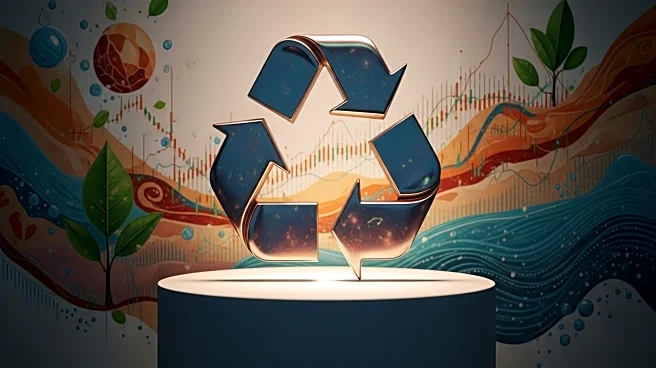What's Happening?
TEL Plastics, a leading player in Bangladesh's recycling industry, is advocating for government incentives to promote the use of recycled products. Kamrul Hasan, the executive director of TEL Plastics, highlighted the challenges faced by the company in a recent interview. Despite the environmental benefits of recycling, recycled products in Bangladesh are subject to a 15% VAT, unlike raw materials imported for recycling, which are VAT-free. TEL Plastics aims to increase its production from recycled plastics to 25% by 2027, up from 15% last year. The company is also working to change public perception, as recycled products are often undervalued compared to their virgin counterparts.
Why It's Important?
The push for VAT-free recycled products is significant as it could enhance the sustainability of Bangladesh's economy by encouraging more businesses to adopt recycling practices. This move could reduce reliance on imported raw materials, saving foreign currency and promoting local industry growth. TEL Plastics' efforts to change public perception about recycled products could lead to increased consumer acceptance and demand, further driving the recycling industry. The company's initiatives align with global trends towards circular economies, where waste is transformed into resources, benefiting both the environment and the economy.
What's Next?
TEL Plastics plans to expand its recycling network and increase its production capacity to meet its 2027 target. The company is also looking to export recycled products to European markets, which have strict compliance and certification requirements. This expansion could position TEL Plastics as a global leader in the recycling industry. Additionally, TEL Plastics is advocating for government support to make recycled products VAT-free, which could significantly impact the industry's growth and sustainability.
Beyond the Headlines
The broader implications of TEL Plastics' initiatives include potential shifts in consumer behavior and industry standards. As recycled products gain acceptance, other industries may follow suit, leading to a more sustainable economy. The company's focus on training and supporting waste collectors and suppliers highlights the social impact of its operations, providing livelihoods and promoting environmental responsibility. TEL Plastics' efforts could also influence policy changes, encouraging other countries to adopt similar measures to support recycling industries.









